

Phone:+86
13333092057 Email: iasos@iasos.eu
Phone:
+30 6999398373 Email: coyote@iasos.eu
 |
 |
|
| Phone:+86
13333092057 Email: iasos@iasos.eu |
Phone:
+30 6999398373 Email: coyote@iasos.eu |
| Chargers
controllers
for wind turbine: "Iasos".
|
| All
models of chargers controllers of our company have the same functions
and are anjusted in the same way.
The difference from one model to another is the nominal power. All charger controllers models of our company have two input gates. One gate, the one with MPPT, is used to connect the built-in generator and another gate to connect either photovoltaics or a second generator. |
| Applicable
to different kinds of batteries. |
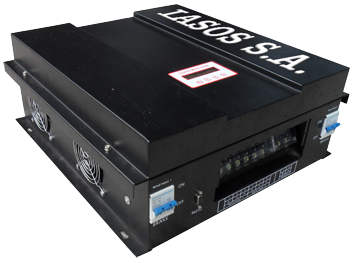 |
||
| PWM
step-less unload mode, which burn the excess power into dump load, making the battery charging in best status. |
|||
| Digital intelligent control, With powerful imported MCU control as the core device. To ensure Simple peripheral circuit Structure, and more flexible and powerful control method and control strategy. |
|||
| Modular
design with simple structure and easy maintenance. |
|||
| This
kind of wind controller is special design for off-grid wind generation
system. Appearance is elegant, operations are easy. It also makes the
course wind generator charge to batteries safely and efficiently. |
|||
| The
choice of operating voltage, is done automatically by the controller.
The controller recognizes the battery voltage and selects operation in
either 12 dcv or 24 dcv or 48 dcv. |
|||
| Perfect
protection function: Battery overcharge protection, Battery over current
protection, Battery reverse connection protection, Open battery protection
,Wind turbine automatic brake and manual brake, thus the system has higher
reliability. |
|||
|
PARAMETERS,
WHEN THE CONTROLLER OPERATES WITH 12 DCV BATTERIES. |
||||
|
Rated
wind power: |
1 Kw ~ 3,5 Kw |
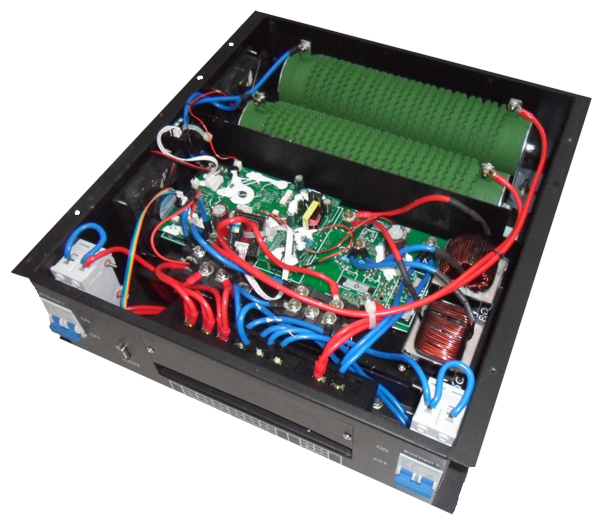 |
||
|
Nominal system voltage: |
12 DCV | |||
|
Wind
turbine maximum input current: |
15
A |
|||
|
Dump
load start voltage: |
60 V (adjustable) | |||
| It depends on what model generator use. | ||||
| Dump load start voltage: | 500 RPM (adjustable) | |||
| It depends on what model generator use. | ||||
|
Battery
over discharge limit voltage (Low): |
10.2 V (adjustable) | |||
|
Battery over discharge limit recovery voltage (Rlow): |
11.5 V (adjustable) | |||
|
Battery
over charge limit voltage (Full): |
14.7 V (adjustable) | |||
|
Battery
over charge limit recovery voltage (RFull): |
13.2 V (adjustable) | |||
|
Float
voltage (Flot): |
13.5 V (adjustable) | |||
| Output over discharge voltage: | 17.5 V (adjustable) | |||
| Output over discharge recovery voltage: | 15.0 V (adjustable) | |||
|
Wind
pole logarithm (Pole): |
10D (adjustable) | |||
|
Wind
charging range: |
DC (25-150) V | |||
|
Wind
start charging voltage (CutIn): |
25 V (adjustable) | |||
| Wind dumpload voltage (Vmax): | 160 V (adjustable) | |||
| Dump load control mode: | Over rotate speed limiting, Over voltage limiting, Over Current limiting, PWM. | |||
| Wind charging mode: | MPPT | |||
| Display mode: | LCD | |||
| Display content: | Battery:
Voltage, charging current, Percentage of battery power. Wind: Voltage, charging current, rotate speed, output current, output power. |
|||
| Operating temperature & Relative humidity: | - 20 C° ~ +55 C° / 35 ~ 85 % RH (Non-condensing). | |||
| Quiescent power drain: | < 3 W | |||
| Protection type: | Battery:
Over-discharge protection, over-charge protection, anti-reverse connection,
outside switch. Wind: Over rotate speed protection, over voltage protection, over current protection. |
|||
| Controller size: | 450 mm * 423 mm * 174.43 mm | |||
| Package size: | 510 mm * 250 mm * 545 mm | |||
| Net weight: | 14.0 Kg | |||
| Gross weight: | 15.5 Kg | |||
| PARAMETERS,
WHEN THE CONTROLLER OPERATES WITH 24 DCV BATTERIES. |
|||
| Rated
wind power: |
1 Kw ~ 3,5 Kw | 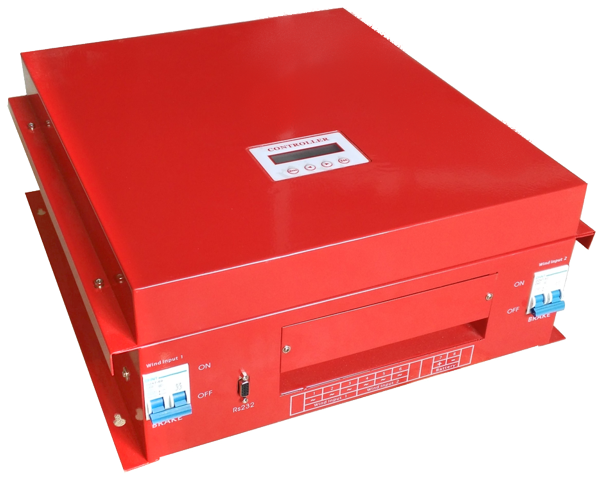 |
|
| Nominal system voltage: |
24 DCV | ||
| Battery
over-discharge limit voltage (Low): |
20.4 V (adjustable) | ||
| Battery over-discharge limit recovery voltage (Rlow): |
23.0 V (adjustable) | ||
| Battery
over-charge limit voltage (Full): |
29.4 V (adjustable) | ||
| Battery
over-charge limit recovery voltage (RFull): |
26.4 V (adjustable) | ||
| Float
voltage (Flot): |
27.0 V (adjustable) | ||
| Wind
dumpload rotate speed (Rota): |
500 RPM (adjustable) | ||
| It depends on what model generator use. | |||
| Wind
pole logarithm (Pole): |
10D (adjustable) | ||
| It depends on what model generator use. | |||
| Wind
charging range: |
DC (25-150) V | ||
| Wind
start charging voltage (CutIn): |
25 V (adjustable) | ||
| Wind dumpload voltage (Vmax): | 160 V (adjustable) | ||
| Dump load control mode: | Over rotate speed limiting, Over voltage limiting, Over Current limiting, PWM. | ||
| Wind charging mode: | MPPT | ||
| Display mode: | LCD | ||
| Display content: | Battery:
Voltage, charging current, Percentage of battery power. Wind: Voltage, charging current, rotate speed, output current, output power. |
||
| Operating temperature & Relative humidity: | - 20 C° ~ +55 C° / 35 ~ 85 % RH (Non-condensing). | ||
| Quiescent power drain: | < 3 W | ||
| Protection type: | Battery:
Over-discharge protection, over-charge protection, anti-reverse connection,
outside switch. Wind: Over rotate speed protection, over voltage protection, over current protection. |
||
| Controller size: | 450 mm * 423 mm * 174.43 mm | ||
| Package size: | 510 mm * 250 mm * 545 mm | ||
| Net weight: | 14.0 Kg | ||
| Gross weight: | 15.5 Kg | ||
|
PARAMETERS,
WHEN THE CONTROLLER OPERATES WITH 48 DCV BATTERIES. |
|||
|
Rated
wind power: |
1 Kw ~ 3,5 Kw |
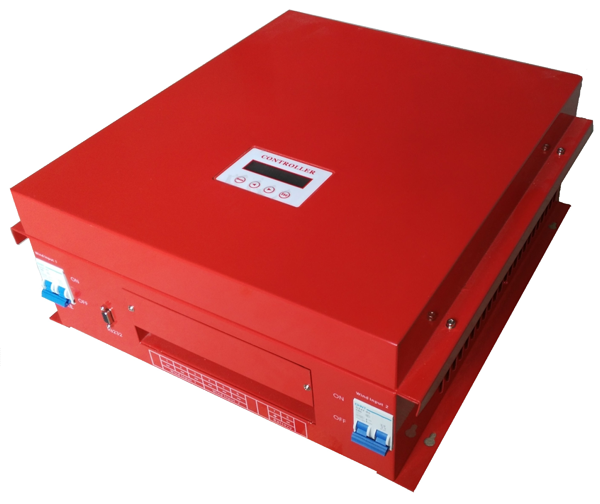 |
|
|
Nominal system voltage: |
48 DCV | ||
|
Battery
over-discharge limit voltage (Low): |
40.8 V (adjustable) | ||
|
Battery over-discharge limit recovery voltage (Rlow): |
46.5 V (adjustable) | ||
|
Battery
over-charge limit voltage (Full): |
58.8 V (adjustable) | ||
|
Battery
over-charge limit recovery voltage (RFull): |
52.8 V (adjustable) | ||
|
Float
voltage (Flot): |
54.0 V (adjustable) | ||
|
Wind
dumpload rotate speed (Rota): |
500 RPM (adjustable) | ||
| It depends on what model generator use. | |||
|
Wind
pole logarithm (Pole): |
10D (adjustable) | ||
| It depends on what model generator use. | |||
|
Wind
charging range: |
DC (25-200) V | ||
|
Wind
start charging voltage (CutIn): |
40 ~ 50V (adjustable) | ||
| Wind dumpload voltage (Vmax): | 200 V (adjustable) | ||
| Dump load control mode: | Over rotate speed limiting, Over voltage limiting, Over Current limiting, PWM. | ||
| Wind charging mode: | MPPT (Boost and Buck) | ||
| Display mode: | LCD | ||
| Display content: | Battery:
Voltage, charging current, Percentage of battery power. Wind: Voltage, charging current, rotate speed, output current, output power. System: State, generated energy, error code. |
||
| Operating temperature & Relative humidity: | - 20 C° ~ +55 C° / 35 ~ 85 % RH (Non-condensing). | ||
| Quiescent power drain: | < 3 W | ||
| Protection type: | Battery:
Over-discharge protection, over-charge protection, anti-reverse connection,
outside switch. Wind: Over rotate speed protection, over voltage protection, over current protection. |
||
| Controller size: | 450 mm * 423 mm * 174.43 mm | ||
| Package size: | 510 mm * 250 mm * 545 mm | ||
| Net weight: | 15.5 Kg | ||
| Gross weight: | 17.0 Kg | ||
| Important
note: Wherever referred solar, suggests the second input to controller connection, which can be used also for solar connection. |
||||
| 1. |
Product
Introduction. |
|||
| |
1.1 |
Functions and Features. | ||
| 1.1.1. |
Basic Functions | |||
| Wind Turbine and Load Adaptive Impedance Matching, maximize energy utilization. | ||||
| |
There is internal resistance in Wind generators, batteries and loads. According to impedance matching principle, only when input impedance equals to output impedance, power utilization is maximal, get the maximum power. | |||
| Protect wind generator from over-revolution speed, over-voltage and over-current. | ||||
| Max revolution speed, max voltage and max current of wind generator could be set. Once the actual revolution speed, voltage or current over the set ones, PWM intelligent unloading will start automatically. That protect wind generator. | ||||
| Intelligent limiting of batteries max current. | ||||
| Batteries maximum capacity could be set through this controller. According to the set maximum capacity, controller could calculate the maximum charging current. Then batteries will be protected. | ||||
| Function of manual brake. | ||||
| Wind charging manual switch. | ||||
| On the controller you can manually set whether using wind charge to battery. | ||||
| BOOST and BUCK function in one. | ||||
| Once
wind generator voltage is lower than battery voltage, controller starts
boost module automatically. Wind generator voltage is increased to the charging
voltage, and it is boost charging. When wind generator voltage is higher
than battery voltage, in order to acquire max power, buck module of controller
will be started, the generator is buck charging. Loads lower the revolution speed of wind generator, when it is breeze. That decreases the output power of wind generator. Through max current tracking (MCT) and max power point tracking (MPPT), output of wind generator is stabilized at the max balance of wind energy utilization. Combine with boost and buck function, wind energy utilization is increased. |
||||
| RS232 interface. | ||||
| By
serial interface communication, you could monitor the whole system, storage
and analyze data. Program could be upgraded by serial interface. Connect PC and controller by serial interface. You could set the parameters on PC and controller simultaneously. Software is free, easy to operate and no need to be installed. |
||||
1.2. |
Design. | |||
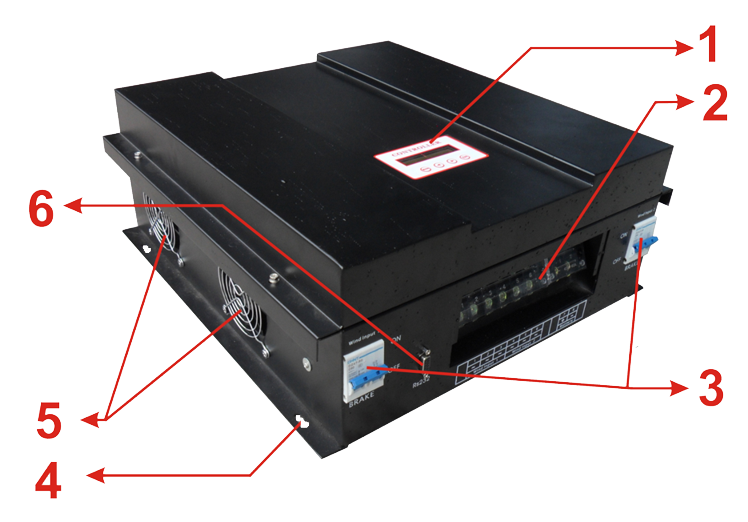 |
||||
1. |
LCD
display panel. |
|||
A
friendly human-computer interaction interface. Running data and configuration
parameters are displayed in the LCD screen. Parameters could be set by
keys on the panel. |
||||
2. |
Terminal
block. |
|||
Connect
wind generator, pv panel, battery and load. |
||||
3. |
Manual
brake. |
|||
4. |
Mounting
holes. |
|||
Install
controller. |
||||
5. |
Resistance
cooling fan and System cooling fan. |
|||
This
fan rotates when wind generator braking ,cooling the resistances. |
||||
This
fan rotates when charging current is too high, cooling the system. |
||||
6. |
Communication
interface. |
|||
| 2. |
Installation
and Electrical Connection. |
|||
2.1. |
Installation. |
|||
2.1.1. |
Mounting Notes. |
|||
| Read
through this entire section first before beginning installation. |
||||
All
mounting work must only be performed by professional personnel. |
||||
Disconnect
all sources of power to the controller before installing or adjusting. |
||||
Do
not allow water and snows enter the controller. |
||||
Install
in locations where is dustless, airy and avoid direct sunlight. |
||||
If
install controller in a cabinet, make sure there is enough space for controller
heat-dissipating. |
||||
Keep
controller away from corrosive gas and intense electromagnetic interference. |
||||
Locate
the product in where easy to install, electrical connection and service. |
||||
2.1.2. |
Mounting
Steps. |
|||
1. |
Choose
mounting location.(Please refer to installation notes). |
|||
2. |
Check
for clearance around the location; make sure there is enough space for
connecting cables. |
|||
3. |
Prepare
tools for installation. |
|||
4. |
Place
the controller to the mounting location. |
|||
5. |
Check
that the controller is securely mounted. |
|||
2.2. |
Electrical Connection. | |||
2.2.1. |
Overview of Electrical Connection. | |||
 |
||||
2.2.2. |
Wiring Notes. |
|||
Improper
operation during the wiring process can cause fatal injury to the operator
or unrecoverable controller damage. Only qualified personnel can perform
the wiring work. |
||||
All
cables must be undamaged, properly insulated and adequately dimensioned. |
||||
Make
sure that all cables are firmly attached. Unsecured cables create loose
and resistive connections which may lead to excessive heating and /or
fire. |
||||
For
mobile applications, be sure to secure all wiring, avoid loose connections. |
||||
2.2.3. |
Wiring Steps (Follow the bellow suggestions and steps to connect). |
|||
2.2.3.1. |
Battery Wiring. |
|||
 |
||||
Connect
battery positive(+) and negative(-) wires to controller as shown in figure
2.2.3.1. |
||||
Be
careful of avoiding short circuit when wiring the battery. |
||||
Before
wiring the battery, keep the battery switch of controller (BATTERY) on
OFF, Do not switch it to ON untill you confirm the wiring is correct and
safe. |
||||
Although
controller has the protection of battery anti-reverse, but anti-connecting
of positive (+) and negative(-) is forbidden. |
||||
2.2.3.2. |
Wind
Generator Wiring
. |
|||
Connect
wind generator wires to controller as shown in figure 2.2.3.1. |
||||
The
wind generator could produce high voltages. Be careful of electric shock. |
||||
When
it is breeze or windless, connection of wind generator and controller
would be safer and better. Only when controller is in the state of start-up,
high-speed rotate wind generator could be connected. |
||||
2.2.4. |
Confirm Wiring. |
|||
Double-check
the wiring. Make sure each connection is correct. Secure no loose and
resistive connections. |
||||
| 3. |
Operation. |
|||
3.1. |
Description of Buttons. |
|||
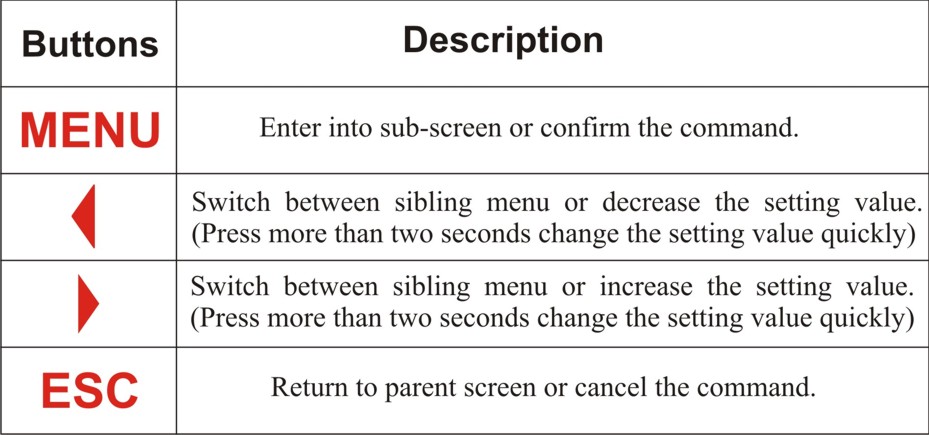 |
||||
3.2. |
Overview
of LCD Menu. |
|||
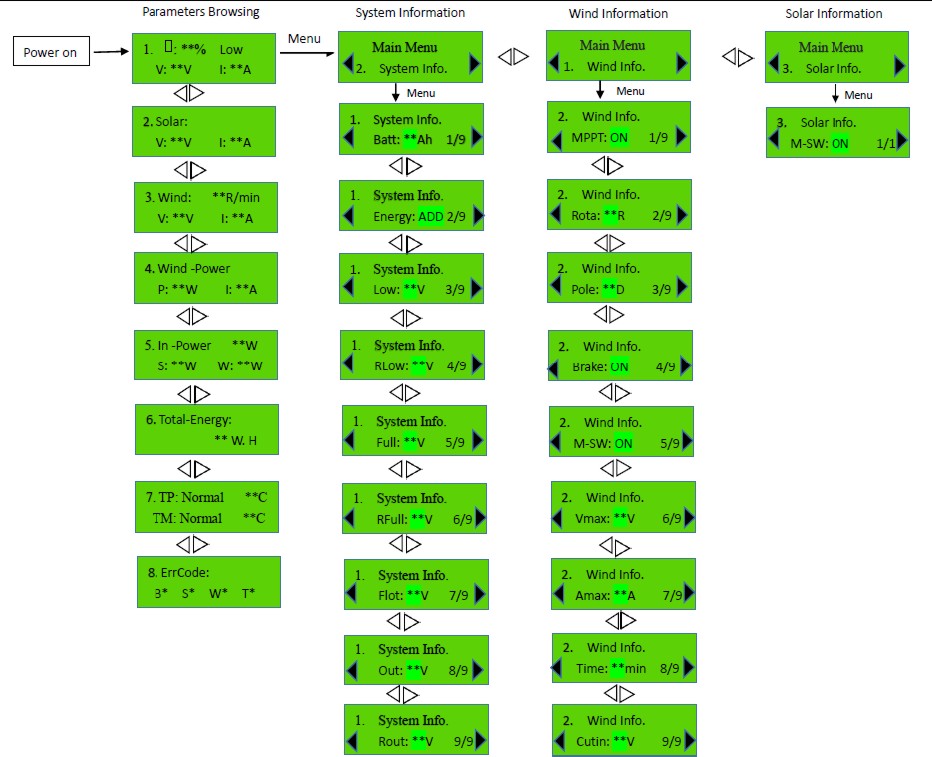 |
||||
The
gray shaded parameters could be set manually by users. |
||||
Parameter
setting steps: |
||||
1. |
Press
“Menu” to enter the setting state, setting
value would flash. |
|||
| 2. |
Press
" |
|||
3. |
After
step 2, press “Menu” to save the setting,
press “Esc” to back out. |
|||
3.3. |
Parameters Browsing. |
|||
3.3.1. |
Battery. |
|||
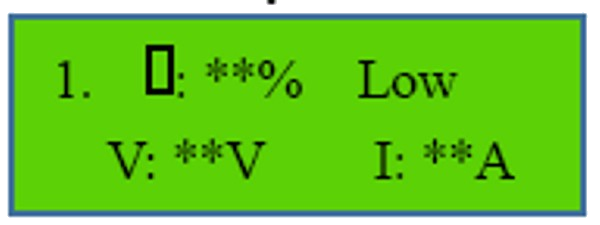 |
||||
**%—
Percentage of battery power |
||||
Right
corner have below displays: |
||||
Low—Battery
over-discharge protecting |
||||
Normal—Battery
is normal |
||||
Full—Battery
over-charge protecting; |
||||
Float—Floating |
||||
Ft:**s
—Countdown of exiting float(countdown start from 30s) |
||||
V—Battery
voltage. |
||||
I—Battery
charging current. |
||||
3.3.2. |
Solar. |
|||
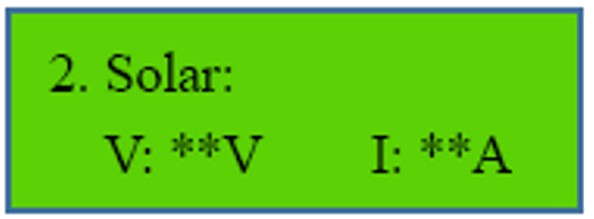 |
||||
V—Solar
voltage |
||||
I—Solar
charging current |
||||
3.3.3. |
Wind. |
|||
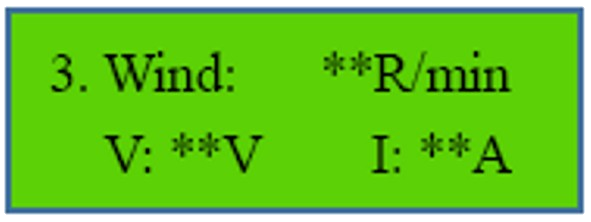 |
||||
**R/min—
rotating speed of wind generator. (Normal working state is this display), |
||||
Other
displays: |
||||
|
W1:
Brake—wind generator is manually braked |
||||
|
W2:
**S—when battery voltage is greater than “Full”, generator is braking.
Exit braking “Time” countdown. |
||||
|
W3:
**S—when rotate speed of wind generator is greater than “Rota”, generator
is braking. Exit braking “Time” countdown. |
||||
|
W4:
**S—when wind generator voltage is greater than “Vmax”, generator is braking.
Exit braking “Time” countdown. |
||||
|
W5:
**S—when wind generator current is greater than “Amax”, generator is braking.
Exit braking “Time” countdown. |
||||
|
W*
:Stay—Exit braking “Time” countdown finish, wind generator still stay
brake. |
||||
“Full”.
It should be set in step 5/9 settings "System information". |
||||
“Rota”.
It should be set in step 2/9 settings "Wind
information". |
||||
“Vmax”.
It should be set in step 6/9 settings "Wind
information". |
||||
“Amax”.
It should be set in step 7/9
settings "Wind information". |
||||
“Time”.
It should be set in step 8/9
settings "Wind information". |
||||
|
V—wind
output voltage. |
||||
|
I—wind
charging current. |
||||
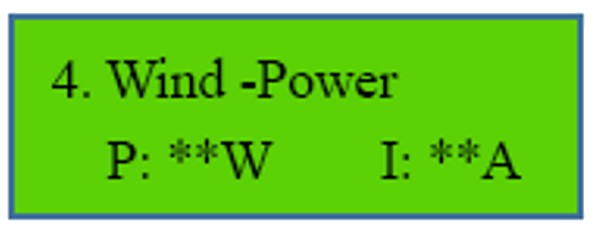 |
||||
|
V—wind
output power. |
||||
|
I—wind
output current. |
||||
3.3.4. |
Input. |
|||
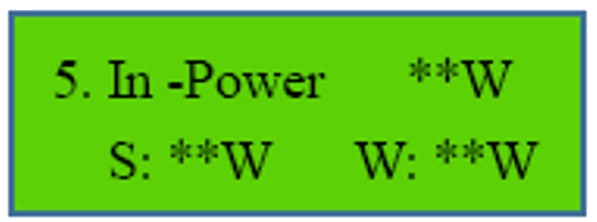 |
||||
In-Power—total
input power. |
||||
S—solar
input power. |
||||
W—wind
input power. |
||||
3.3.5. |
Total
Generated Energy. |
|||
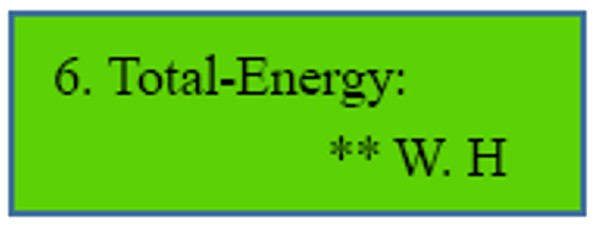 |
||||
Total-Energy—total
generated energy. |
||||
This
value is cumulative. If want to start from 0, set "ENER"
in step 2/9 settings "Wind information". |
||||
3.3.6. |
Temperature
Protection. |
|||
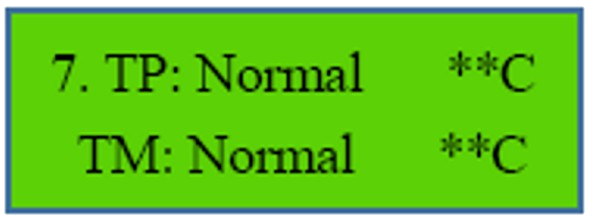 |
||||
TP—controller
device working temperature. |
||||
TL—MOS
fet temperature. |
||||
Normal:
Temperature is normal. |
||||
Error:
Temperature detection module is error. |
||||
OTP:
Over-temperature protection. |
||||
**C:
**Celsius degree. |
||||
3.3.7. |
Error
Code |
|||
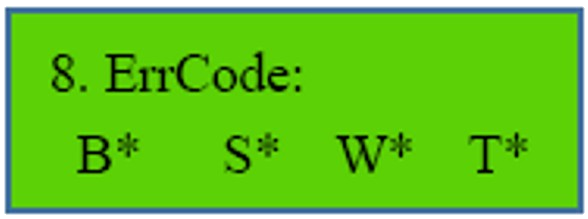 |
||||
B1—battery
over-discharge. |
||||
B2—battery
over-charge. |
||||
S1—solar
input voltage is high. |
||||
S2—solar
charging module short-circuit fault. |
||||
S3—solar
charging module open-circuit fault. |
||||
W1—wind
generator is manually braked. |
||||
W2—battery
voltage is greater than “Full”, wind generator brakes. |
||||
W3—wind
generator rotate speed is greater than “Rota”, generator brakes. |
||||
W4—wind
generator voltage is higher than “Vmax”, generator brakes. |
||||
W5—wind
generator current is greater than “Amax”, generator brakes. |
||||
W6—brake
module short-circuit fault. |
||||
W7—wind
charging module short-circuit fault. |
||||
W8—wind
charging module open-circuit fault. |
||||
W9—wind
input voltage is high. |
||||
T1—MOS
fet detection module fault. |
||||
T2—MOS
fet over-temperature protection. |
||||
T5—controller
device detection module fault. |
||||
T6—controller
device over-temperature protection. |
||||
*0—work
normal. |
||||
3.3.8. |
USB (This is optional function, if not purchase, there is no the following
display). |
|||
 |
||||
****-**-**—Year-Month-Day.
|
||||
USB**—USB
state |
||||
USB
interface has the following states: |
||||
USBOK—USB
well connected |
||||
USBNC—USB
not connected |
||||
USBdErr—USB
conversion module damaged or not connected |
||||
USBFULL—USB
stick is full |
||||
**:**:**—Hour:
Minute: Second. |
||||
3.4. |
System
Information. |
|||
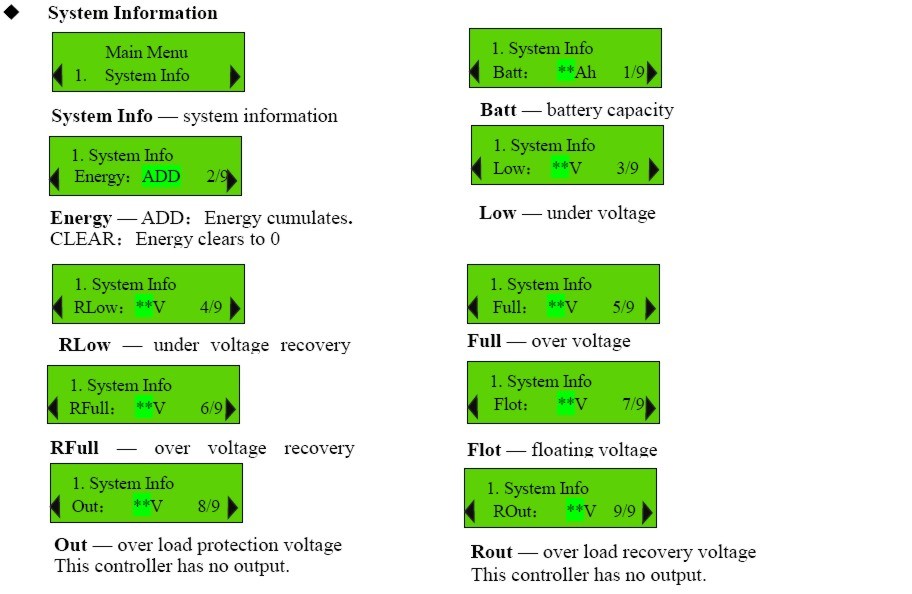 |
||||
3.5. |
Wind
Information. |
|||
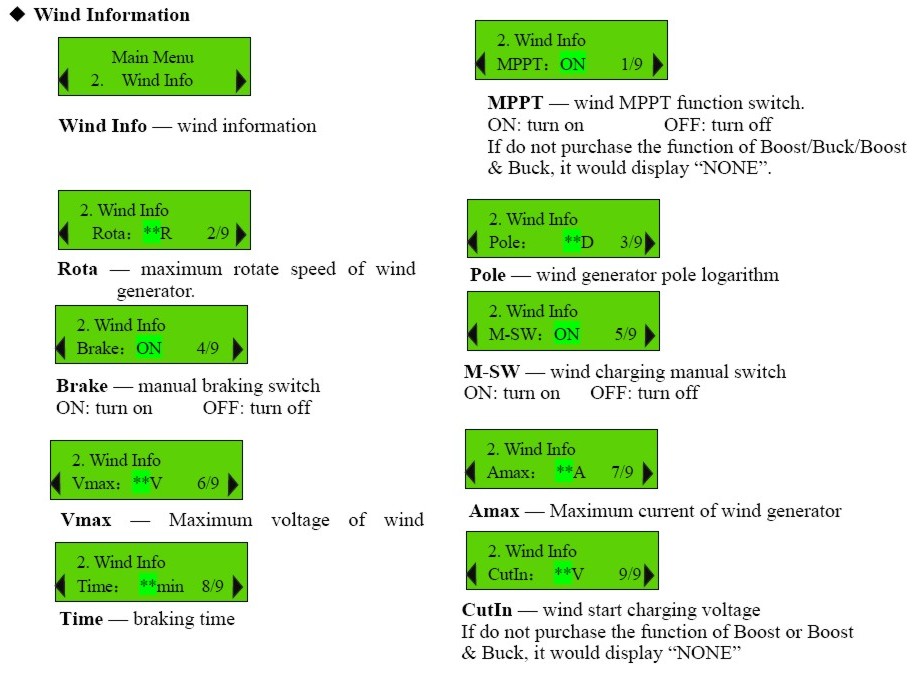 |
||||
3.6. |
Solar Information. |
|||
 |
||||
3.7. |
Date and Time Setting. |
|||
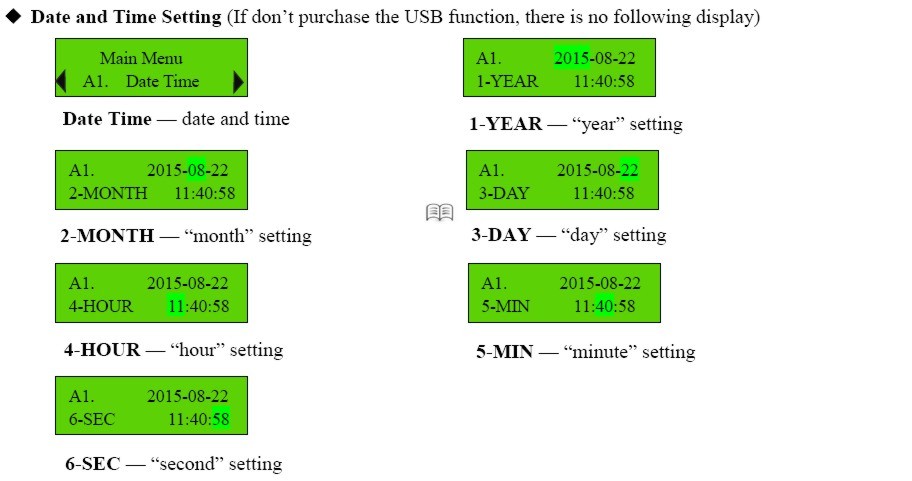 |
||||